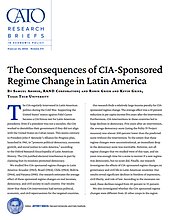The CIA regularly intervened in Latin American politics during the Cold War. Supporting the United States’ stance against Fidel Castro became a CIA litmus test for Latin American presidents. Even if a president was not a socialist, the CIA worked to destabilize their government if they did not align with the United States on Cuban issues. This seems contrary to President John F. Kennedy’s Alliance for Progress plan, launched in 1961, to “promote political democracy, economic growth, and social justice in Latin America,” according to the Oxford Research Encyclopedia of Latin American History. The CIA justified electoral interference in part by claiming that its missions promoted democracy.
We studied five CIA-sponsored regime changes in Latin America: Ecuador (1963), Brazil (1964), Chile (1964), Bolivia (1964), and Panama (1981). Our research estimates the average effect of these sponsored regime changes on real incomes, democracy, and civil society in each country. Our results show that these CIA interventions had serious political, economic, and civil repercussions for the targeted countries.
Our research finds a relatively large income penalty for CIA-sponsored regime change. The average effect was a 10 percent reduction in per capita income five years after the intervention. Furthermore, CIA interventions in these countries led to large declines in democracy. Five years after an intervention, the average democracy score (using the Polity IV Project measure) was almost 200 percent lower than the predicted score without the intervention. To the extent that these regime changes were unconstitutional, an immediate drop in the democracy score was inevitable. However, not all regime changes that we studied were of this type, and six years was enough time for a score to recover if a new regime was democratic, but no score did. Finally, our research investigates the effects of CIA-sponsored regime changes on governance and civil life in Latin American countries. Our results reveal significant declines in freedom of expression, civil liberty, and rule of law. According to the measures we used, these declines ranged from 20 percent to 35 percent.
We also investigated whether the CIA-sponsored regime changes were different from 25 other coups in the region between 1963 and 1981. All coups were similar in that they were conducted by militaries, but differences emerged with respect to characteristics of the countries before a coup. Among countries that experienced CIA-sponsored regime change, democracy scores were not particularly high the year before the intervention, and average per capita income was $4,109 (2011 US dollars). However, these democracy scores and average per capita income were higher than the same measures right before coups in countries that experienced non-CIA-sponsored regime change. Among those countries, average per capita income was $3,196 (2011 US dollars) the year before a coup. Additionally, the average scores for freedom of expression, civil liberties, and rule of law were higher in countries that experienced CIA-sponsored regime change than in countries that experienced non-CIA-sponsored regime change.
Thus, the CIA did not intervene in countries that were particularly badly off relative to others in the region. If anything, the agency intervened in countries that were more democratic, were richer, and had more civil liberties, freedom of expression, and rule of law than other countries that experienced coups during those decades.
Overall, our research is the first to our knowledge to document a clear causal link between CIA-sponsored regime change and deteriorating economic activity and governance in Latin America. Any benefits that accrued to the United States from these interventions must be weighed against the large costs that were imposed on the people living in the affected countries.
NOTE
This research brief is based on Samuel Absher, Robin Grier, and Kevin Grier “The Consequences of CIA-Sponsored Regime Change in Latin America,” European Journal of Political Economy 80 (December 2023).

This work is licensed under a Creative Commons Attribution-NonCommercial-ShareAlike 4.0 International License.
